Britain’s former strongest woman has revealed how lifting weights during her pregnancy has helped her maintain a high level of fitness, despite an avalanche of hate.
Shannon Smith, 30, from Royton, Oldham, lifted weights throughout her pregnancy, from the day she found out she was pregnant until two days before her due date.
The professional weightlifter even participated in competitions during her pregnancy and lifted a staggering 200kg two days before her daughter Nancy was born.
Shannon said: ‘It doesn’t make sense for me to stop doing it during pregnancy. This is something I’ve done for the last 10 or 11 years of my life; It’s practically my life. I felt safe doing it.
‘At 36 weeks pregnant, many people told me that I could barely put on my shoes at this stage or that I could barely walk. While I was just living my normal life.’
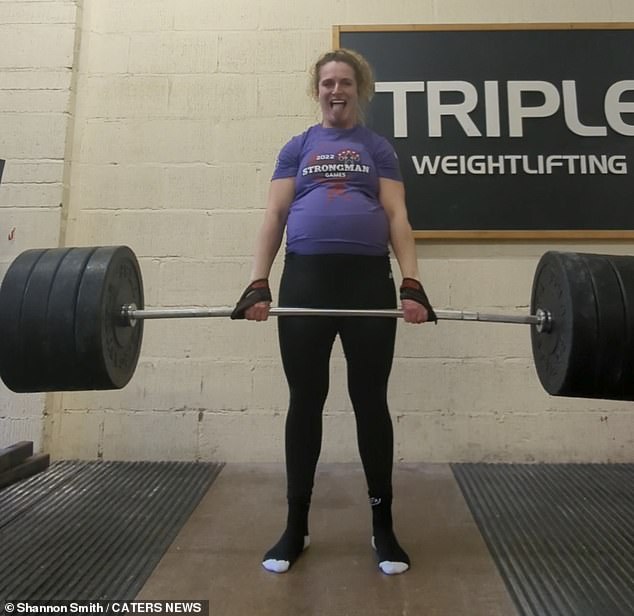
The 30-year-old was lifting 200kg weights two days before her due date, but says she felt safe doing so


Former Britain’s Strongest Woman Shannon Smith (pictured) has revealed how lifting weights during her pregnancy helped her maintain a high level of fitness.
When Shannon found out she was pregnant, she had no intention of stopping her weightlifting career and intended to maintain her fitness by continuing in the gym.
Throughout her pregnancy, the ever-competitive Shannon continued her deadlifting and powerlifting and even competed in local competitions, training about five times a week for hours at a time.
When she was nearing the end of her pregnancy, Shannon was lifting around 180kg, but two days before her due date, she said she was feeling “strong” and pushed herself to deadlift 200kg, which she did.
The weightlifter then posted her achievement on social media, causing a storm online with millions of views, but was also met with hate for the post.
She said many people were concerned about the safety aspect of her weightlifting and criticized her for lifting weights so late in her pregnancy.
However, she stated that it was completely safe for her to continue lifting weights during pregnancy because she had been doing it her entire life.
Shannon gave birth to her daughter Nancy less than a week after lifting 200kg and she is perfectly healthy and has already visited the gym for the first time.
Newborn Nancy was taken to the gym when she was four days old to get used to the surroundings because Shannon and her husband Paul are professional weightlifters.
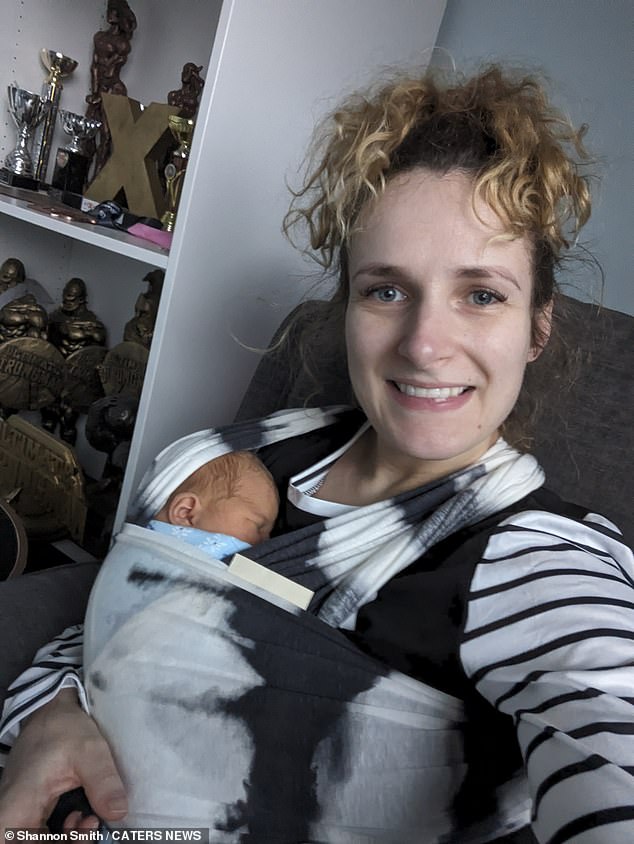

Despite strenuous exercise, Shannon gave birth to her perfectly healthy daughter, Nancy (pictured)


The mother stated that it made no sense for her to stop lifting weights during pregnancy because she had been doing it for the last decade.
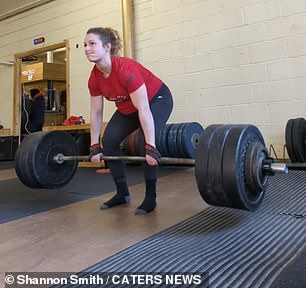

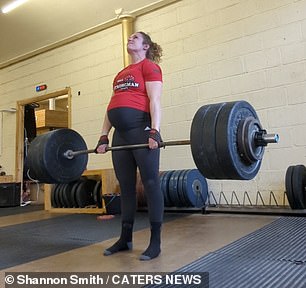

Eight months pregnant, Shannon also participated in a weightlifting competition to help increase her strength levels.
Reflecting on her pregnancy, Shannon said lifting weights has helped her body cope with the stress of having a baby.
Now, Shannon hopes Nancy grows up to follow in her footsteps as a weightlifter, and said her genetics would adapt to the gym.
She said: “She will grow up in the gyms and as my partner and I are strong, she will have good genetics for it.”
‘I went back to the gym four days after giving birth, but it was light because I have to get my pelvic floor and abdominal muscles back to where they were. Therefore, it will take a couple of months to regain that level of strength.
‘I also competed in a weightlifting competition when I was eight months pregnant. “That gave me a little bit of purpose to keep pushing myself, but within a level that I was capable of.”


Shannon was active after giving birth to her daughter Nancy (pictured) and took her to the gym for the first time when she was four days old.
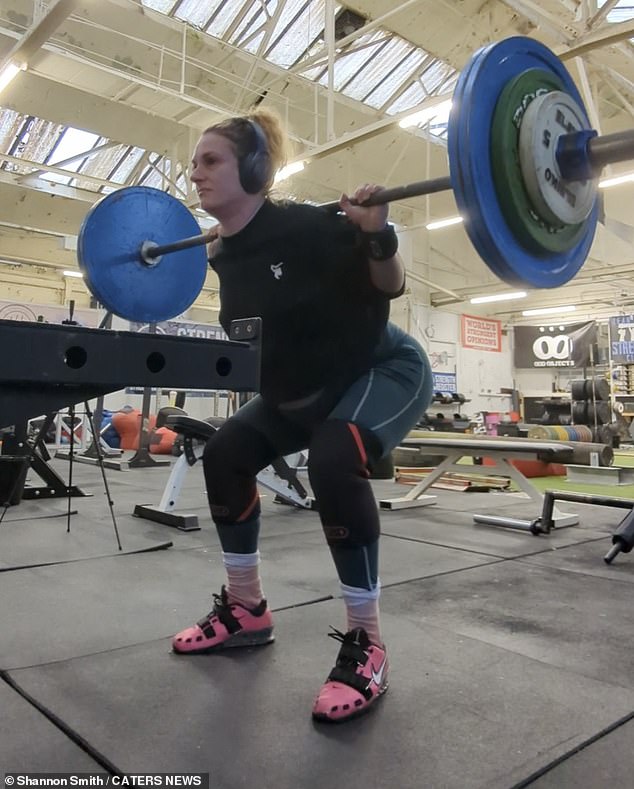

The mother-of-one caused a storm online after sharing a clip of her lifting heavy weights while pregnant on social media.


After sharing her trip online, Shannon received negative comments from users who claimed she could harm the baby.
Shannon continued, “I still had some kind of goal and competitiveness with myself and to make progress in everything, but as the months went by, there were certain exercises that I had to keep gradually abandoning and I just kept doing the ones that felt safest.” for me.
‘The heaviest weight lifted while pregnant with a deadlift was 200 kilos. She squatted 155 kilos and then did some overhead pressing around 85 kilos. Most of them were about 90 percent of my previous bests before I got pregnant.
“I think it’s also helped with recovery after giving birth, because now, five days after giving birth, a lot of people at this stage wouldn’t leave the house or do much, and I’m already back in the gym.
‘I felt comfortable with deadlifts and squats. It just took a little time to get used to the change in center of mass.
‘For women who have always had it up, it’s okay to continue, especially if they have an uncomplicated pregnancy. If you have problems with high blood pressure, preeclampsia, or if you have a placenta under a baby, that can cause problems.


During her pregnancy, Shannon managed to deadlift 200kg, squat 155kg, and shoulder press approximately 85kg.
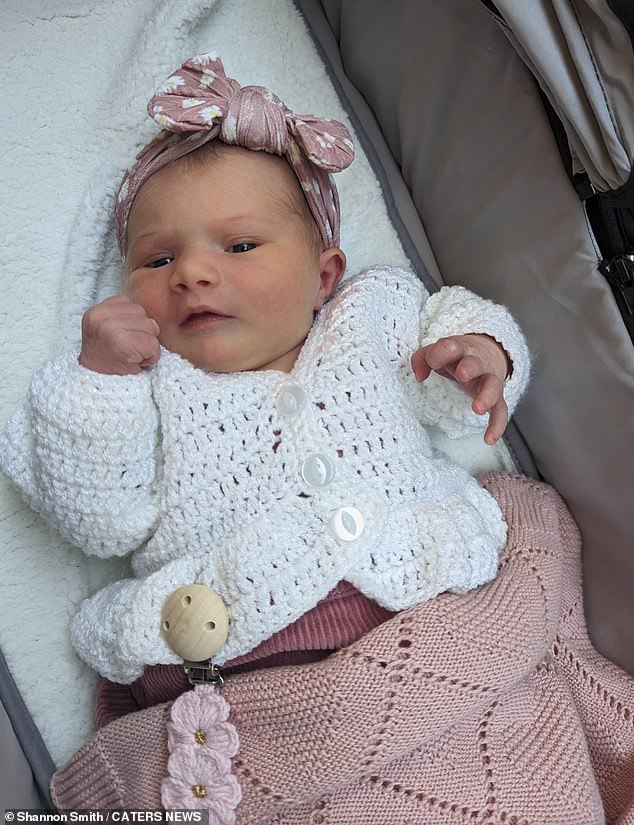

Shannon hopes Nancy will also enjoy lifting heavy weights in the gym once she’s old enough.
‘Most women will know when they are taking things too far and I know when to tone it down a bit. The gym was the safest (place) I felt during my entire pregnancy!’
On the subject, Dr Lawrence Cunningham of UK Care Guide said: “In my experience, pregnancy does not necessarily stop women from doing their usual exercise routines, even at an advanced level such as lifting 200kg weights.”
‘However, lifting more than 200 kg just a few days before the expected delivery date is not common or advisable without very specific considerations.
‘Safety will largely depend on the person’s fitness level before pregnancy, their experience with weight lifting, and their health during pregnancy.
‘I have seen cases where professional athletes have managed to maintain a high level of activity throughout their pregnancy without any adverse effects.


The 30-year-old woman’s husband, Paul Smith (pictured left), is also a successful weightlifter and spends a lot of time in the gym.
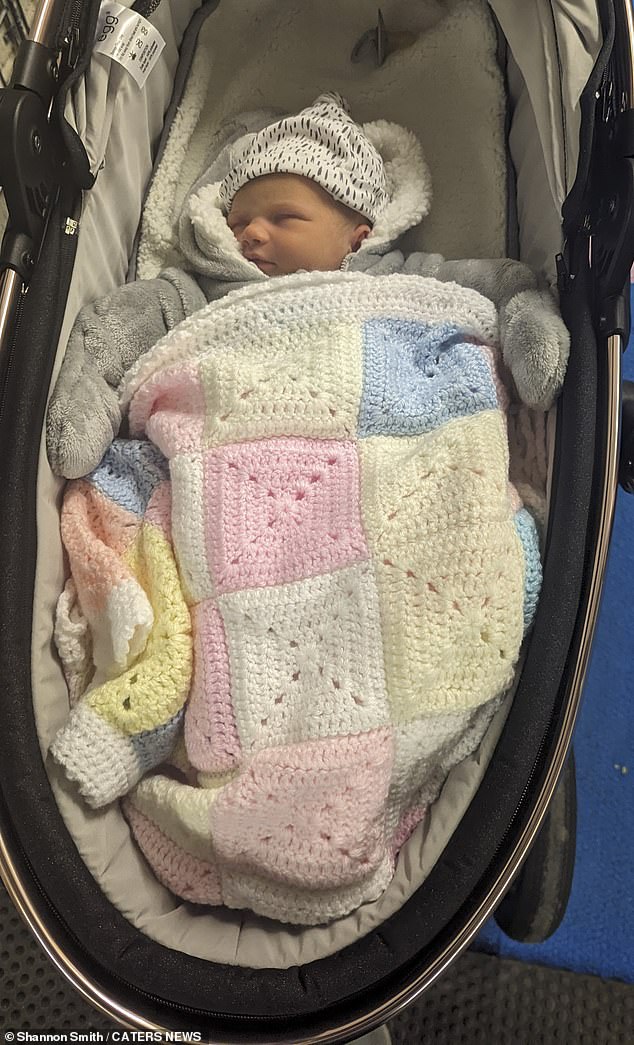

Shannon has taken Nancy to the gym to familiarize her with the surroundings because her parents are professional weightlifters.
‘However, this should not be considered the norm and should not be taken as a blanket endorsement for all pregnant people.
‘I always recommend that anyone who is pregnant, especially those who engage in high-intensity activities such as weightlifting, consult thoroughly with their GP.
“This includes ongoing monitoring of your health and that of your fetus, along with adjustments to your routine as the pregnancy progresses.”
He concluded: ‘It is essential to listen to the body’s signals and reduce the intensity when necessary. Additionally, maintaining proper form and technique becomes even more crucial to avoiding injury.
